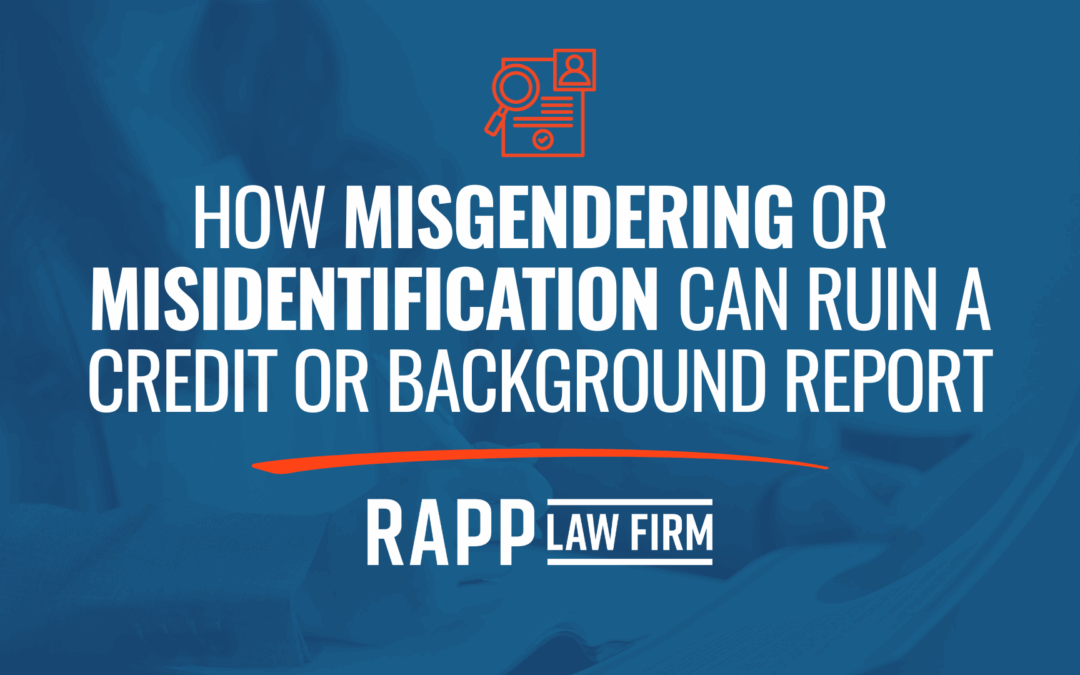Much of our world is automated. While this brings efficiency in some areas, it can bring aggravation in others. If you underwent a name or gender change after transitioning, you are hoping for accuracy, but in the eyes of databases, you might be faced with misgendering or misidentification.
These mistakes can have serious legal and financial consequences, especially when they show up in a credit report or background check. Many individuals who have gone through these transitions have been denied jobs, homes, loans, or insurance due to inaccurately represented identities.
These are not rare mistakes. These are systemic problems in the way data is collected, processed, and shared.
At the end of the day, these problems can ruin your credit and background report.
How Gender Changes and Name Changes Cause Consumer Reporting Errors
For individuals who have legally changed their name or gender marker, it is common for credit bureaus, background screening companies, and other reporting agencies to fail to update their records accordingly. These systems might also incorrectly create duplicate profiles or merge two separate profiles into one.
This can lead to discrepancies that could cause falsely reported missed payments, duplicate accounts, or even criminal records being attributed to the wrong individual. Without knowing it, you could have two active accounts at once, one with the correct information and one with the wrong information.
Third-party screen agencies may also pull from outdated or mismatched public records, relying on speed over accuracy. This could lead to your accounts being flagged as a fraud risk or as someone with a criminal background because your information does not match.
Why These Errors in Credit Reports and Background Checks Are So Harmful
When your credit report contains inaccurate information, such as your previous name or gender, or even someone else’s financial history, the damage can occur quickly. You may be denied a credit card, loan, or employment.
You might also see your credit score fall without explanation. However, if a new name is reported, there is a chance that your credit history falters, making it look incomplete, and leading to a drop in credit score.
If your background check is faulty because of a name or gender change, you might be rejected for a job or a possible security clearance, as it appears as a mismatched identity.
If your new name or gender leads to a duplicate profile being made or an incomplete merger of profiles, your credit report and background check might read incorrectly to those who check it.
What to Do if You’ve Been Misidentified or Misgendered in a Report
If you notice incorrect information on your credit report or background check that relates to your gender, name, or personal identity, the first step is to document everything.
This is your time to request a copy of your credit report from the three major credit bureaus.
If you are able to find the errors, you can dispute the report directly to the credit bureau and to identitytheft.gov. With your documentation, the incorrect reports should also be reported to the companies that supplied the false information.
However, it’s important to understand that many disputes are ignored or inadequately investigated. This is where speaking to a consumer protection attorney becomes essential.
If your case has been ignored or completed in an unsatisfactory way, you have the right under the Fair Credit Reporting Act (FCRA) to connect with a consumer protection attorney who can get your case heard by the large corporations.
Being misgendered or misidentified can completely halt your life if it happens on a credit report or background check. You have the right to a correct credit report. If you are facing false information in your credit report and you are not being taken seriously by large corporations, contact the team at Rapp Law Firm today.

